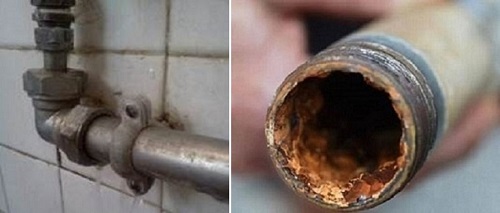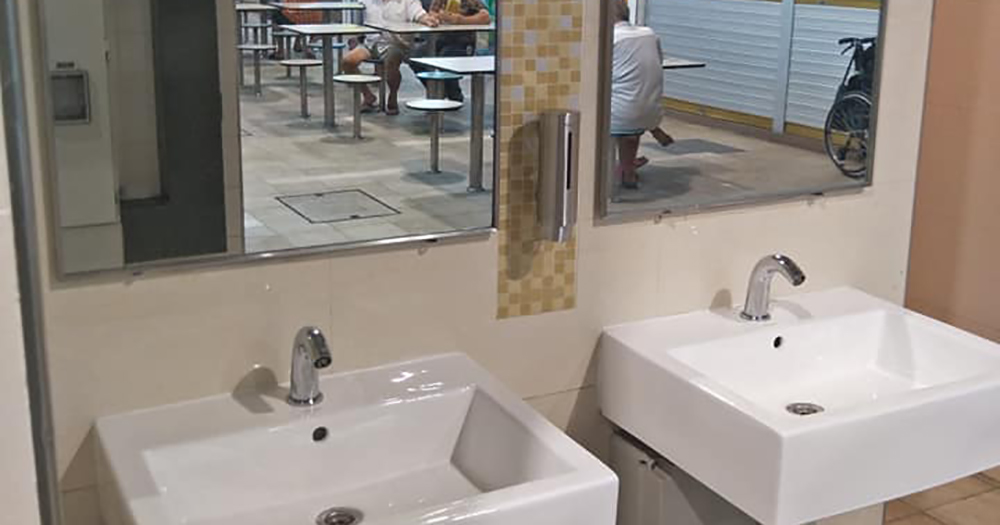Tap water in Singapore is safe to drink, a fact that has been repeated ad nauseam.
Just that what is really nauseating are the toilets and the faucets that dispense the clean water that are super gross, especially at hawker centres.
Reinforcing what the public already knows is another study conducted by CNA's Talking Point.
It reaffirmed the fact that the public cannot get past the psychological barrier of gross looking places supposedly providing safe drinking water.
In total, water samples were collected from 15 taps at different locations and sent for testing.
Five were from public toilets, including those at hawker centres, while another five were collected at HDB flats across Singapore, and the last five were collected from eateries and shopping centres.
All were exceedingly safe to drink.
Well within WHO guidelines
The test revealed that all 15 samples were clean, as predicted, even if they came from dirty locations.
No bacteria was found in any of the water samples -- proving that the external environment might be bad but it cannot contaminate the water.
As for trace metals, such as lead and arsenic, the test found that such substances ranged from 0.02 to 0.3 parts per billion (ppb), well below the World Health Organisation’s guideline of 10 ppb.
Erny Kartolo, one of the founders of a campaign "Drink Wise, Drink Tap", said it is likely the surroundings of the tap could affect the perception of tap water.
Assumption that old, rusty pipes affect water is false
Kartolo said the assumption that old, rusty pipes could contaminate water was also false.
According to the PUB website, the causes of discoloured tap water can stem from:
- Corrosion of iron tank and other components in storage type hot water heater possibly due to end of service life or quality issues,
- Corroded service water pipes and fittings ,
- Stagnant water in service pipes and water service installations from infrequent use (i.e. owners returning from a holiday), and<
- Heavy draw-off from a water mains leak resulting in resuspension of mineral sediments.
 Source: PUB
Source: PUB
Such water is safe to drink, PUB said.
In the event one finds discoloured water in the tap, it is advisable to let the tap run until it is clear, before drinking the water.
PUB said it should be informed if the water has not cleared up within five to 10 minutes.
Mythbuster: Piece of cloth to filter tap water?
As for the common practice of using a piece of cloth to filter tap water, CNA reported that the phenomenon of the cloth turning brown is largely the result of particles that are naturally occurring minerals in the water.
PUB has elaborated on this phenomenon by pointing out that such minerals include iron and manganese, and that the discoloration of the filter is the result of the absorbed particles oxidising.
However, PUB discourages the use of such devices on the grounds that bacteria could grow on the filters if they are not cleaned or replaced regularly.
It is conclusive that tap water that reaches your home and toilets, be they personal or public, is safe to drink as it is.
No difference between bottled water and tap water
Given that Singapore's tap water is potable no matter from where it is dispensed, it is perhaps of little surprise then that another test by Talking Point found that people cannot tell the difference between tap water and bottled water.
Such a conclusion flies in the face of some Singaporeans' belief that tap water is naturally inferior.
Some here have resorted to drinking only bottled Evian water, as well as making use of a home water filtration system that costs over S$2,000, just for showering.
Top image from Marsiling Mall Hawker Centre Merchants and Hawkers Association Facebook
If you like what you read, follow us on Facebook, Instagram, Twitter and Telegram to get the latest updates.
